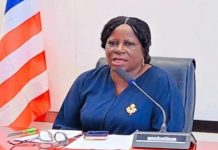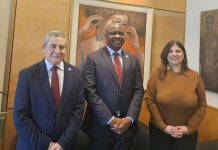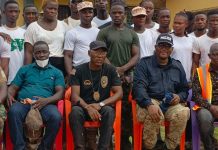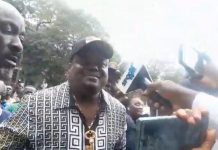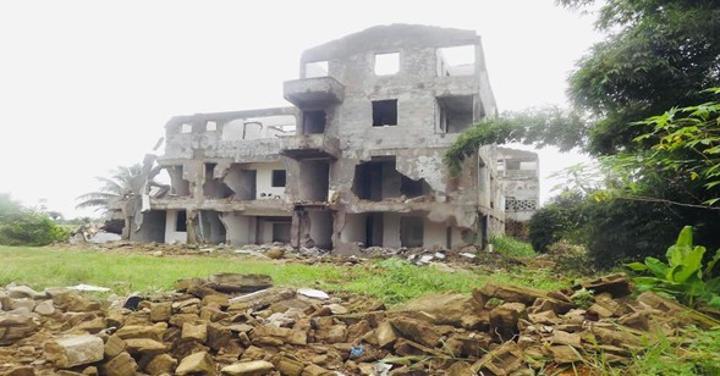
Africa-Press – Liberia. One of the buildings affected by the 2016 Barzoe Tapian Estate-Fendell demolition. Credit: John Kollie, Liberia Media Democratic Initiative.
FENDELL, Liberia— Waiting all day under a mango tree, 28-year-old Daniel Karkpor ekes out a living directing trucks that come by occasionally to places where the drivers can fill up with dirt.
Karkpor’s father, who was his only source of survival, died days after his property, and those of about 2,150 others here, were razed eight years ago to clear land for the expansion of the University of Liberia. Karkpor and other residents have been suffering the consequences and fighting for compensation ever since. They’re last hope now is that the Boakai government.
“After the incident I lost my father,” Karkpor says. “Presently, as I am speaking to you, nothing I am doing. Those trucks, men, when they come looking for dirt, I talk to them and direct them so before they leave in the evening, they can find something for me.”
Daniel Karkpor
In 2016 the University of Liberia, under the direction of the government of then-President Ellen Johnson Sirleaf, demolished the dwellings to clear land for the expansion of the university. The government claimed that the Fendell residents were illegal squatters without deeds to the 5,800 acres it seized. The residents challenged the decision in court, but the government did not wait for an outcome. Residents say the government moved on the land and forcefully removed them—prompting scenes of confusion, protest and despair.
After George Weah became president in 2018, he met with residents, apologized for the government’s actions, and acknowledged that the government had wronged them according to residents. In 2019 President Weah assigned the Liberia Land Authority to create a special committee to bargain with the residents on settlements. The committee’s report – according to a hard copy viewed by FPA/NN at the Authority’s offices – concluded that the University of Liberia acted illegally and recommended payment of $US8 million to the residents of Fendell. That was half the $US16 million in damages the committee estimated was owed to the residents. Weah agreed to meet the residents halfway, according to the report, and the government agreed to pay $US8 million.
John Kollie, whose civil society group, Liberia Media for Democratic Initiatives was a key advocate for the settlement, says an out-of-court agreement was reached five years ago reduced the payment to $US5 million. It is not clear how that court settlement superseded the government’s agreement. A first payment of $US1 million was paid through the Ministry of Public Works, the agency responsible for disbursing the funds, and more than 2,000 victims received partial payments. But no more payments were made.
Adams Monobah, the Authority’s current chairperson and part of the negotiating team, declined to comment because, he says, not all the recommendations the special committee were implemented.
Clarence Karkpor, the older brother of Daniel Karkpor, claims that during the distribution of the first $US1 million to residents, he was compensated a fraction his property’s value.
“My property worth something like over $US30,000,” Karkpor says. “I received $LD111,300 (less than $US600) while I had a school and five houses.”
Karkpor could provide no documents to support his claim.
Another resident frustrated with the slow pace of settlement is Ketteh Kumueh Murray, 70, a retired professor at the University of Liberia, who says he feels hopeless after losing all of his life savings when his property, and plans to build a multi-use commercial center, were destroyed.
“Some of us, that’s everything we had,” Murray says. “I still owe the bank, the money I credited from the bank, money I have my relatives interested in contributing. I put all of that there still we have not been able to get proper redress.”
Dr. Ketteh Kumueh Murray says his $US1.9 million worth property was destroyed in 2016. Credit: Dennise Nimpson/New Narratives.
The report also recommended that the government develop a resettlement plan for each resident of a demolished property and assist recovery by implementing “a sustainable reintegration/livelihood program.”
“The committee report made it clear, and it was established, that the forceful eviction was unprecedented,” says Adama Dempster, a human rights monitor who also advocated for the Fendell victims. “And it was not necessary because the government should be finding shelter for its people rather than making them displaced. As a result, most of them lost their livelihoods, and properties were destroyed. It became a burden for the government, and I think President Weah was open enough to apologize, which we also recognize it because we were fighting for protection.”
Under Weah’s plan, the Public Works Ministry was assigned to disburse funds through its Environmental and Social Safeguard Division’s Resettlement Action Plan. Ministry officials did not provide details of the payments after repeated calls and promises of an interview.
Still, advocates are optimistic that the Boakai-led administration will pay the balance owed to residents. “When the government can pay the balance of $US4 million, then we will feel accomplished that we fought a good fight,” Kollie says.
John Kollie, Executive Director of the Liberia Media Democratic Initiative (LMDI).
“I think it is important that what was promised to the people to be resettlement should be done once and for all,” Dempster says. “Because we still know that some of those people are still living in displacement. They lost everything, and most of their children are not able to go to school. The adequate standard of living has been taken from them so the new government should just go by what or where the last government stopped.”
Viola Lincoln, chairwoman of the Fendell community, says she also has good reason to be hopeful that President Boakai will intervene.
Lincoln says that in 2016 when their homes were destroyed, they reached out to Boakai, then vice president to Sirleaf and in her Unity Party, who said he had been wrongly told that the land claims had been paid off. She says, now that he is president, handling the matter will not be difficult.
“Our expectations are high because it was during Unity Party time our property was broken down,” Lincoln says. “So, before the president now we met him and he says he was not given the right information. Now that he has taken the seat, my expectations are very high. I know we will not have to struggle to get our balance money.”
Viola Lincoln, Chairwoman, Fendell Community
President Boakai has made no public comments on the Fendell residents’ claims.
The Fendell case is one of a long list of land disputes in Liberia. In 2018 – two years after the Fendell land was seized – Liberia passed the Land Rights Act to set a process for communities to claim “customary land” that they had traditionally inhabited. The law was intended to give communities a process to protect the property from the government leasing or selling it as happened in this case. Experts say it would be much more difficult for the government to act with such disregard for owners in future.
That’s little comfort to Fendell’s victims who say it is the government’s responsibility to finally bring their eight-year battle to an end and pay the $US4 million they are owed.
For More News And Analysis About Liberia Follow Africa-Press

